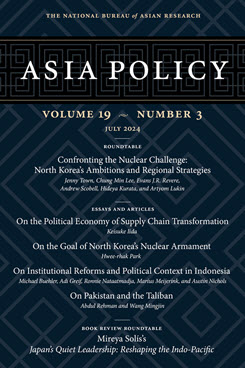Article in Asia Policy 19.3
Institutional Reforms and Political Context
An Evaluation of the Indonesia Procurement Modernization Project
This article assesses the impact of political context on procurement reform outcomes in Indonesia by analyzing the U.S.-Millennium Challenge Corporation’s Procurement Modernization Project from 2013 to 2018 and finds that higher political competition positively influences the adoption of procurement innovations but also correlates with higher perceived corruption.
Executive Summary
MAIN ARGUMENT
By replicating an impact evaluation of the Procurement Modernization Project in Indonesia, we found that political covariates significantly correlate with a subset of key procurement outcomes. The level of political competition within subnational governments influenced the adoption of specific procurement reforms. Concretely, higher political competition was found to positively affect the adoption of procurement innovations such as framework contracting and the use of electronic catalogs. However, higher political competition also correlated with increased levels of perceived corruption. Additionally, the study observed that local bureaucracies led by government heads in their first term were more receptive to implementing procurement management systems. These results underline a complex interplay in Indonesia, and potentially elsewhere, between political competition, leadership tenure, and procurement reform outcomes, suggesting nuanced dynamics in reform effectiveness.
POLICY IMPLICATIONS
- Consideration of political context. Effective procurement reform requires accounting for the local political environment. Reform strategies should be adaptable to these political dynamics to enhance their uptake and sustainability.
- A tailored approach to reform. The variability in reform success based on political competition and leadership term limits indicates the need for a more tailored approach to procurement reform. Strategies might include targeted support for regions with new leadership or high political competition, where the potential for reform adoption appears greater. Similarly, the correlation between political competition and perceived corruption may suggest that procurement reform efforts should be accompanied by robust anti-corruption measures.
- Long-term commitment. The mixed outcomes of the Procurement Modernization Project underscore the need for a long-term commitment to institutional reform, with continuous adaptation and learning from the political landscape to achieve sustainable improvements in procurement practices.
Michael Buehler is a Reader at the Department of Politics and International Studies in the School of Oriental and African Studies (SOAS) at the University of London (United Kingdom).
Adi Greif is a Data Scientist at Lawrence Berkeley National Labs (United States) and was formerly with Abt Associates.
Ronnie Nataatmadja is a Research Associate at Trellis Strategies (United States).
Marius Meijerink is a Monitoring, Evaluation, and Learning Specialist at Abt Associates (United States).
Austin Nichols is a Principal Economist at Amazon (United States). All work on this paper was completed when he was at Abt Associates prior to joining Amazon.
Note: The anonymized data used in this report is available upon request from Marius Meijerink.
About Asia Policy
Asia Policy is a peer-reviewed scholarly journal presenting policy-relevant academic research on the Asia-Pacific that draws clear and concise conclusions useful to today’s policymakers. Asia Policy is published quarterly in January, April, July, and October and accepts submissions on a rolling basis. Learn more


